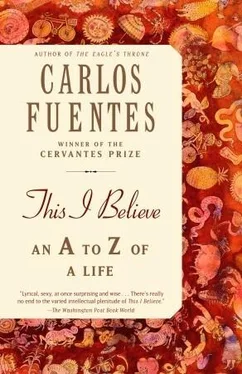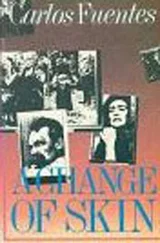Are these mere consolations? Do they constitute a triumph over Death? Or do they do the exact opposite — aggrandize its power? Death tells us: you are fooling yourself, what was no longer is. And we answer: we are fooling you, what was continues to be even more than it ever was. Death laughs at us, daring us to think not of the other person’s death, but of our own disappearance from earth. Death challenges us to believe that the memory of those who survive us will be our only life after death. Whether or not that is true, we will never know. What we do know is that the guardians of our memory will also eventually disappear as well, with the false hope that there will always be some living witness to remember them. Death mocks us: after all, do we remember more than four or five generations back of our own dead? Do we have enough family lore, ancestral portraits, unforgettable events to save the immense legion of our ancestors from mortal oblivion? Are there not thirty ghosts behind every individual soul?
While very few of us can pick out a hero or a genius from our own personal genealogies, we all certainly have access to the great verbal heritage of one of the two greatest poets of the Spanish Golden Age, Francisco de Quevedo (the other being Luis de Góngora). Evidence of death: “¡Cómo de entre mis manos te resbalas! ¡Oh, cómo te deslizas, edad mía. . ¡Oh, condición mortal, oh dura suerte! / ¡Que no puedo querer vivir mañana/sin la pensión de procurar mi muerte!” (How you slip from between my hands! How you slide away, years of my life. . Oh, human condition, oh hard fate! / That I may not hope to live tomorrow / without the payment toward my own death!) But there is evidence, also, of a love that is constant beyond the grave. “Alma a quien todo un dios prisión ha sido. . /su cuerpo dejará, no su cuidado; /serán ceniza, mas tendrá sentido; / polvo serán, mas polvo enamorado.” (Soul which has been a prison to a whole God. . / will abandon the body, but not its love; / they will be ash, but it will still have feeling; / they will be dust, but dust in love.)
John Donne puts another spin on premature death. In his “A Funeral Elegy,” the young woman was fourteen years old, and fate did not allow her through the door to the future; she took the liberty of her own death. But each survivor became a delegate that would fulfill the destiny that might have been hers. And so, a victory over death: “For since death will proceed to triumph still, / He can find nothing, after her, to kill.”
This is the death that belongs to all of us. The death that is shared with the word that conquers Death.
The fact remains, however, that whether we are preceded or succeeded, forgotten or remembered, we nonetheless die alone and, in a very radical sense, we die for ourselves alone. Perhaps we do not die entirely for the past, but we certainly die for the future. Perhaps we will be remembered, but we will no longer remember. Perhaps we will die knowing all the things that there are to know in the world, but from then on, we will only be a thing. We came and were seen by the world. Now, the world will continue to be seen, but we will have become invisible. Whether we are punctual or not, we live according to life’s schedule. But Death is time without schedules, without hours. Is there any greater glory than that of imagining my death to be singular, exclusively for me, with preferred seating in the great theater of eternity?
There are those who hope that Death will liberate them from their own memory. So many suicides. There are people who for their entire lives (or what is left of them) will regret not having paid attention, offered a helping hand, or listened to some person or other who is now gone forever. There is the silence of that very masculine love that must wait until death to emerge, and only then tells the dead person all the things that he never could have said, out of modesty, while he or she was alive: a tapestry of burdens and lamentations that are like a second shroud laid upon the dead person. And will the dead person have exercised his right to carry a secret to his grave? Is that not one of the great rights of life, to know that we know something that we will never reveal to anyone?
For all the denials and inevitabilities that pile upon our heads, for all the testimonies and certainties of the impossible that the prosecutor of Death presents to us, we resist giving up the notion that Death is nothing — it is something, it is important, we tell ourselves, even when Death herself tells us otherwise. We reassure ourselves that death today will grant presence to the life of yesterday. With Pascal, we repeat, “Never say ‘I lost it.’ Better to say: ‘I have returned it.’ ” And we must believe this to be true. That there are some people who die to be loved more. That our beloved ones who are dead live on because the love that united us still lives on in our lives. That only the things that do not wish to survive at any price truly have the chance to live. And to want to live at any price is the curse of the vampire that lives within us.
It is also an erotic opportunity. In Wuthering Heights, Cathy and Heathcliff are united by a passion that knows it is fatally doomed. Heathcliff’s somber greatness lies in his awareness that all his social actions — vengeance, the acquisition of money, the humiliation of those who humiliated him, the childhood days shared with Cathy — will never return. Cathy knows this too and for this reason, because “I am Heathcliff,” she leaps prematurely into the only thing that resembles the lost land of original love: the Land of Death. Cathy dies so that she can say to Heathcliff, “Death is our true home, meet me here.” Death is the true kingdom of Eros, the place where erotic imagination replaces physical absence and, most especially, the radical separation created by Death.
Death, Georges Bataille tells us in his magnificent essay on Wuthering Heights, is origin disguised. Given that it is impossible to return to the original time of love, the lovers’ passion can only be consummated in the eternal and immutable time of death. Death is an endless moment. Why? Because Death, in the most extreme sense, has renounced the calculation of interest. Nobody who is dead can say “This works for me” or “This doesn’t work for me,” “I win” or “I lose,” “I rise” or “I fall.” In Juan Rulfo’s Pedro Páramo, this is the novelist’s final victory over his own cruel, calculating character who, unlike Heathcliff, remains anchored in the immortality of his unrequited love for Susana San Juan. In exchange for this defeat, Rulfo introduces us, along with the entire town of Comala, to our own death. Because of this novelist, we have been present at our own death. We are better able to understand that the life/death duality does not exist, that the life-or-death option does not exist, that Death is in fact part of life, that everything is life. We can imagine, then, that every child born every minute is the reincarnation of every person that dies every minute. There is no way to know whom we reincarnate because there are never witnesses on hand to recognize the reincarnated person. But if there was one single witness able to recognize me as the person I was before, then what? He stops me on the street. . as I get into a car or walk into a restaurant. . he takes me by the arm. . and forces me to participate in a past life that once was mine. That person is a survivor, the only person who can possibly know that I am a reincarnation. The only person who can possibly tell me, “One life is not enough. Many existences are required to create the character of a single person.”
But if one life is not enough to fulfill all the promises of our individual characters, truncated by death, do we run the risk of going to the opposite extreme, of thinking that spirit is everything and matter nothing? That one is eternal, the other temporal? Or does nothing really die fully, neither spirit nor matter? Do they evolve in the same way? We know that thoughts are transmitted beyond death. Can bodies be transmitted as well?
Читать дальше












